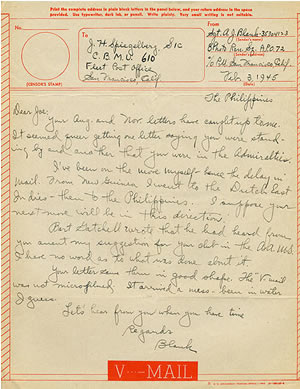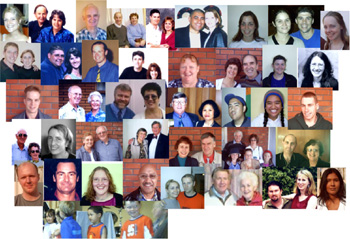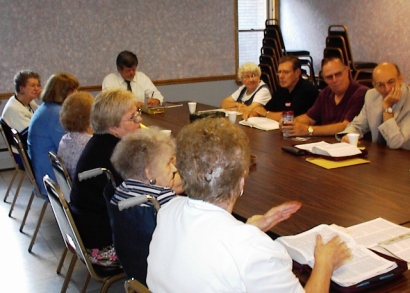The Evil of Modern Technology
 Saturday, October 25, 2008 at 09:34AM
Saturday, October 25, 2008 at 09:34AM  “Many shall run to and fro, and knowledge shall be increased.” Daniel 12:4
“Many shall run to and fro, and knowledge shall be increased.” Daniel 12:4
Here I am, sitting in a house heated by a gas/forced air furnace, illuminated by an incandescent bulb, writing down my thoughts on a computer screen, accessing the internet by a wireless connection and weighing in against modern technology. I will be the first to tell you, however, that I don’t want to go back to the way it was, even a few decades ago, when I shivered over a lone heat register in the kitchen, pounded out my writing assignments on an ancient typewriter with a faded ribbon, waiting for my water to boil on a gas stove and my cinnamon toast to bake in the oven. Daily life has been so revolutionized by a steady progression of technological improvements that few of us can imagine living any other way. Conveniences have become such necessities that anyone who has no microwave, cell phone or digital alarm clock is considered deprived.
Man’s inventive genius continues to prolifically breed new technologies, and with each new technology, a cottage industry springs up to feed, clothe and shelter it. Computers have generated software, music, movies, photo-shopping and enough peripheral gadgetry to fill a catalog. With the cell phone came personal ringers, phone cameras, text messaging, GPS capabilities, internet access, ebooks, and on and on. Automobiles can now do much more than transport passengers. They can pamper, comfort, entertain, advise, warn and tell drivers how to get to their destination. We now foresee the day when we won’t even have to steer the machine down the highway. There seems to be no end to our fertile imaginations. But I am haunted by the words of an old evangelist. He said, “Man will never hold out long enough morally to do what he wants to do scientifically. Even as we mount up to the heavens in the space age, we mire down in the mud of sin and shame.” I see this chilling prediction coming true before our very eyes and ears in the twenty-first century. Our heads cannot out-smart our hearts.
Something is insanely wrong with all of this progress. Not only have promises of utopia not materialized for the bulk of civilization, in many cases we have regressed back to prehistoric levels. We have not eliminated murder; we have made murder easier. We have not eliminated theft; we have made stealing easier. We have not eliminated racism; we have made racism easier. We have not eliminated pornography; we have made pornography easier. Inherent within the new technologies we find all the old maladies. Good things undeniably come from our scientific and technological breakthroughs. Unfortunately, these developments have also been subverted for evil purposes. Indeed, the evil we have enabled may end up canceling out the good we have created in society at large.
The most obvious example of this is nuclear technology. The fascinating capabilities of nuclear fission for energy also gave rise to the most destructive weapon ever invented. Regardless of how atomic weaponry is used—whether for defensive purposes or aggressive military action—the fact remains that it is used to kill and destroy. Other scientific discoveries have also been channeled into military uses, like rocketry, aerodynamics, fiber optics, laser beams, radar, modulated radio and television signals, satellites, etc. If it helps, we can make it hurt. If it heals, we can make it injure. If it does good, we can make it do bad. This position has been argued in philosophical terms as well. Regent University’s website on communication contains this paragraph:
“Whether one accepts the neutrality of technology depends on one’s valuing philosophy—whether one tends toward the pragmatic and situational, or the absolute and authoritarian. Those who believe that technology is neutral argue that “guns don’t kill people, people do”, or that a knife can be used to “cook, kill, or cure.” Those who believe the opposite counter with evidence that technology cannot be evaluated in a vacuum. Monsma (1986) argued for the “value-ladenness” of technology (chapter 3). He based his premise on two traits that he believed are common to all technological developments: (1) technological objects are unique; they are designed to function in a particular and limited way, and (2) technological objects are intertwined with their environment; they interact in unique ways with the rest of reality.”
In medical science we can find an alarming example of the limits of technology. Jerome Groopman wrote an article in the New Yorker Magazine, August 11, 2008, entitled “Superbug: The new generation of resistant infections is almost impossible to treat.” He said, “In August, 2000, Dr. Roger Wetherbee, an infectious-disease expert at New York University’s Tisch Hospital, received a disturbing call from the hospital’s microbiology laboratory. At the time, Wetherbee was in charge of handling outbreaks of dangerous microbes in the hospital, and the laboratory had isolated a bacterium called Klebsiella pneumoniae from a patient in an intensive-care unit. “It was literally resistant to every meaningful antibiotic that we had,” Wetherbee recalled recently. The microbe was sensitive only to a drug called colistin, which had been developed decades earlier and largely abandoned as a systemic treatment, because it can severely damage the kidneys. “So we had this report, and I looked at it and said to myself, ‘My God, this is an organism that basically we can’t treat.’ ”
Much of the toxic social climate we experience today comes to us at the hands of modern technology. Who can dispute the widespread conviction that television has had a deleterious effect on culture? It is a waster of time, numbing minds and killing creativity. It has also piped pure filth from a godless and immoral Hollywood into the living rooms of the world. The radio has dispensed anarchy, vulgarity and corruption through the powerful medium of music, especially targeting adolescents and teenagers. In the last decade, pornography has spread wildly throughout the internet, victimizing viewers who would seldom or never come in contact with sexual perversion any other way.
Amazingly, these same technologies have transmitted as much or more truth, virtue, goodness and love as they have depravity. How is this possible? Is technology, then, culpable? Innocent? Morally neutral? In The Gutenberg Galaxy (1962), Marshall McLuhan wrote, “The theme of this book is not that there is anything good or bad about print but that unconsciousness of the effect of any force is a disaster, especially a force that we have made ourselves” (p. 248). Regent University comments “Insert any technology for the word “print” and you realize that for McLuhan it is not the content that really matters. In this case it is not even the channel but rather our knowledge and understanding of the medium’s potential impact.” They then ask, “Is print an amoral technology? Can any technology be amoral? These are issues that must be addressed and answered before we can begin to develop a philosophical system to address the convergence of media and technology, and its impact on society.”
I contend that communication technology has the greatest potential for evil of all the developments of modern science. This should not surprise us who are in the business of spreading the gospel. After all, Jesus commissioned the church to “Go ye therefore, and teach all nations.” The very means and methods used by the church to carry out the work of Christ has been co-opted by Satanic forces to destroy the gospel and spew corruption throughout the world. The advent of the online community was initially envisioned as a dynamic way to connect the inventive genius, the soaring imaginations and the scientific knowledge of individuals, groups, schools and cultures together, thus exponentially multiplying the positive impact they were making on the world. But in the parallel universe of evil, it was also appropriated by malevolent forces to connect with people who shared the same destructive designs. Roger Cohen expresses the same view in the New York Times column of March 10, 2008.
“The main forces in the world today are the modernizing, barrier-breaking sweep of globalization and the tribal reaction to it, which lies in the assertion of religious, national, linguistic, racial or ethnic identity against the unifying technological tide.
“Connection and fragmentation vie. The Internet opens worlds and minds, but also offers opinions to reinforce every prejudice. You’re never alone out there; some idiot will always back you. The online world doesn’t dissolve tribes. It gives them global reach.”
The very internet I access to research my topics is simultaneously used to teach people to build bombs, incite hatred, instigate anarchy, commit fraud, buy and sell illicit drugs, learn witchcraft, poison minds and dismantle Christian traditions. More specifically, it provides a way for terrorist organizations to plot destructive acts, devise conspiracies, obtain funding for their violent activities and inspire each other’s dark causes. If this world is facing global chaos and apocalyptic demise, it will undoubtedly be facilitated by the technology now in existence or soon to be developed. Groups of people who otherwise had no way to unify and combine forces to wreak havoc upon the world now find it easy to locate each other and strengthen their hands. One only has to recall the tragedy of September 11, 2001 to know that cell phones and the internet aided nineteen terrorists to coordinate their diabolical plan. Without the assistance of technology, their deed would not have been possible or would have been infinitely more difficult to carry out.
Technology may not be inherently evil, but neither is it inherently good. We are unforgivably naïve to trust in scientific advances to spread the gospel or do the work of the church. Technology certainly will never be our savior. In fact, the future holocaust it will most assuredly precipitate may well eclipse any good that it has ever done for us. The best gifts to mankind do not come from himself, but from God. “Every good gift and every perfect gift is from above, and cometh down from the Father of lights, with whom is no variableness, neither shadow of turning.” James 1:17. This warning may find application at the local congregational level where churches are growing increasingly dependent upon technology for worship, singing, preaching and witnessing. But technology in the larger arena of the world needs to be viewed by the church as suspect. It’s potential for evil means that it will never be the best friend of the church. Let us use it, work it and enjoy it. Let us also keep it at arms length, distant from our souls. We do not need computers, cell phones, radios, televisions, headphones, iPods, CD’s, DVD’s, satellites, telescopes or any other technological devices to have a meaningful relationship with God. Paul’s Mars Hill sermon said this, “That they should seek the Lord, if haply they might feel after him, and find him, though he be not far from every one of us: For in him we live, and move, and have our being.” Acts 17:27-28.
The greatest technology to ever come to man may be the glorified body that God has prepared for them that love him. How close will that body allow us to be to God in a physiological sense? I’m not sure, but I do know what the scripture says. “Dear friends, now we are children of God, and what we will be has not yet been made known. But we know that when he appears, we shall be like him, for we shall see him as he is.” 1 John 3:2. (NIV) That’s the technological advance that excites me more than any other. In an instant, all worldly innovations will be rendered obsolete. We must not sell ourselves short by losing our soul to earthly things.
.






